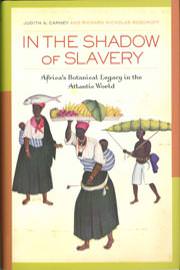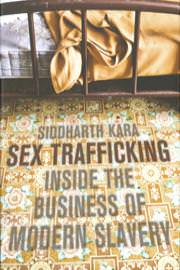2010 Frederick Douglass Prize
Information on the Frederick Douglass Book Prize Competition
CONTACT:
Dana Schaffer 203-432-3339 dana.schaffer@yale.edu
Chelsea van der Gaag 646-366-9666 vandergaag@gilderlehrman.org
Dorie Baker 203-432-8553 dorie.baker@yale.edu
Marilyn Wilkes 203-432-3413 marilyn.wilkes@yale.edu
For Immediate Release: November 5, 2010
Judith Carney, Siddharth Kara, and Richard Rosomoff to Share $25,000 Frederick Douglass Book Prize
New Haven, Conn. - Judith A. Carney, Professor of Geography at the University of California, Los Angeles, Siddharth Kara, Fellow on Human Trafficking at Harvard University, and Richard Nicholas Rosomoff, an independent writer, have been selected as the co-winners of the 2010 Frederick Douglass Book Prize, awarded for the best book written in English on slavery or abolition. Carney and Rosomoff won for their book In the Shadow of Slavery: Africa’s Botanical Legacy in the Atlantic World (University of California Press), and Kara won for his book, Sex Trafficking: Inside the Business of Modern Slavery (Columbia University Press).

The prize is awarded by Yale University’s Gilder Lehrman Center for the Study of Slavery, Resistance, and Abolition and the Gilder Lehrman Institute of American History based in New York City. Carney, Kara, and Rosomoff will share the $25,000 prize, which is the most generous history prize in the field. The prize will be presented at a dinner in New York City in February 2011. The other finalist for the prize was Robert E. McGlone for his book John Brown’s War Against Slavery (Cambridge University Press). This year’s finalists were selected from a field of nearly 100 entries by a jury of scholars that included Edward Ball (independent author), Jeffrey Ferguson (Amherst College), and Martha Hodes (New York University). The winners were selected by a review committee of representatives from the Gilder Lehrman Center for the Study of Slavery, Resistance and Abolition, the Gilder Lehrman Institute of American History, and Yale University. “In the Shadow of Slavery tells the fascinating story of how enslaved Africans shaped and changed the landscape of the New World,” says Hodes, the 2010 Douglass Prize Jury Chair and Professor of History at New York University. “With remarkable originality, the authors reveal how the men and women of the Middle Passage wielded their agricultural experience as part of the unending struggle to control their own lives. Interpreting archival evidence with both rigor and creativity, Carney and Rosomoff explore the provisioning of slave ships, the transfer and diffusion of African horticultural knowledge, the botanical gardens of slaves, and the gastronomic legacies of black slavery, among many other intriguing topics. Comprehensive and compelling, this is a work of truly global dimensions that narrates the ordeal of enslavement as a simultaneous story of food, memory, and survival.”

Hodes remarks that Kara’s book Sex Trafficking, “carefully and compassionately convinces us to understand the phenomenon of modern-day human sex trafficking as part of the history of slavery and abolition.” She continues, “For his research, Kara posed as a customer across Asia, Europe, and the United States, entangling himself with perpetrators and speaking confidentially with victims. Sidestepping sensationalism and absent any delusion of casting himself as a rescuer, Kara relates wrenching stories in lucid prose, thereby shedding a strong and steady beam of light on a widespread and ongoing global crime. With an exemplary mixture of courage and humility, the author combines a gripping first-person narrative with trenchant economic analysis and clear-eyed proposals for change. In the end, this book prevents us from consigning slavery to the past.”
The Frederick Douglass Book Prize was established in 1999 to stimulate scholarship in the field of slavery and abolition by honoring outstanding books. Previous winners were Ira Berlin and Philip D. Morgan in 1999; David Eltis, 2000; David Blight, 2001; Robert Harms and John Stauffer, 2002; James F. Brooks and Seymour Drescher, 2003; Jean Fagan Yellin, 2004; Laurent Dubois, 2005; Rebecca J. Scott, 2006; Christopher Leslie Brown, 2007; Stephanie E. Smallwood, 2008; and Annette Gordon-Reed, 2009.
The award is named for Frederick Douglass (1818-1895), the slave who escaped bondage to emerge as one of the great American abolitionists, reformers, writers, and orators of the 19th century.
The Gilder Lehrman Center for the Study of Slavery, Resistance and Abolition, a part of The Whitney and Betty MacMillan Center for International and Area Studies at Yale University, was established in November 1998 through a generous donation by Richard Gilder and Lewis Lehrman and the Gilder Lehrman Institute of American History. Its mission is to promote the study of all aspects of slavery, especially the chattel slave system and its destruction. The Center seeks to foster an improved understanding of the role of slavery, slave resistance, and abolition in the founding of the modern world by promoting interaction and exchange between scholars, teachers, and public historians through publications, educational outreach, and other programs and events.
Founded in 1994, the Gilder Lehrman Institute of American History is a nonprofit organization improving and enriching American history education through a wide range of programs and resources for students, teachers, scholars, and history enthusiasts throughout the nation. Gilder Lehrman creates and works closely with history-focused schools; organizes summer seminars and development programs for teachers; produces print and digital publications and traveling exhibitions; hosts lectures by eminent historians; administers a History Teacher of the Year Award in every state and U.S. territory; and offers national book prizes and fellowships for scholars to work in the Gilder Lehrman Collection as well as other renowned archives. Gilder Lehrman hosts www.gilderlehrman.org, serving as the gateway to American history online and featuring the quarterly online journal History Now, designed specifically for K-12 teachers and students.
For further information on Gilder Lehrman Center events and programming, contact the center by phone (203) 432-3339, fax (203) 432-6943, or e-mail gilder.lehrman.center@yale.edu.
# # #
